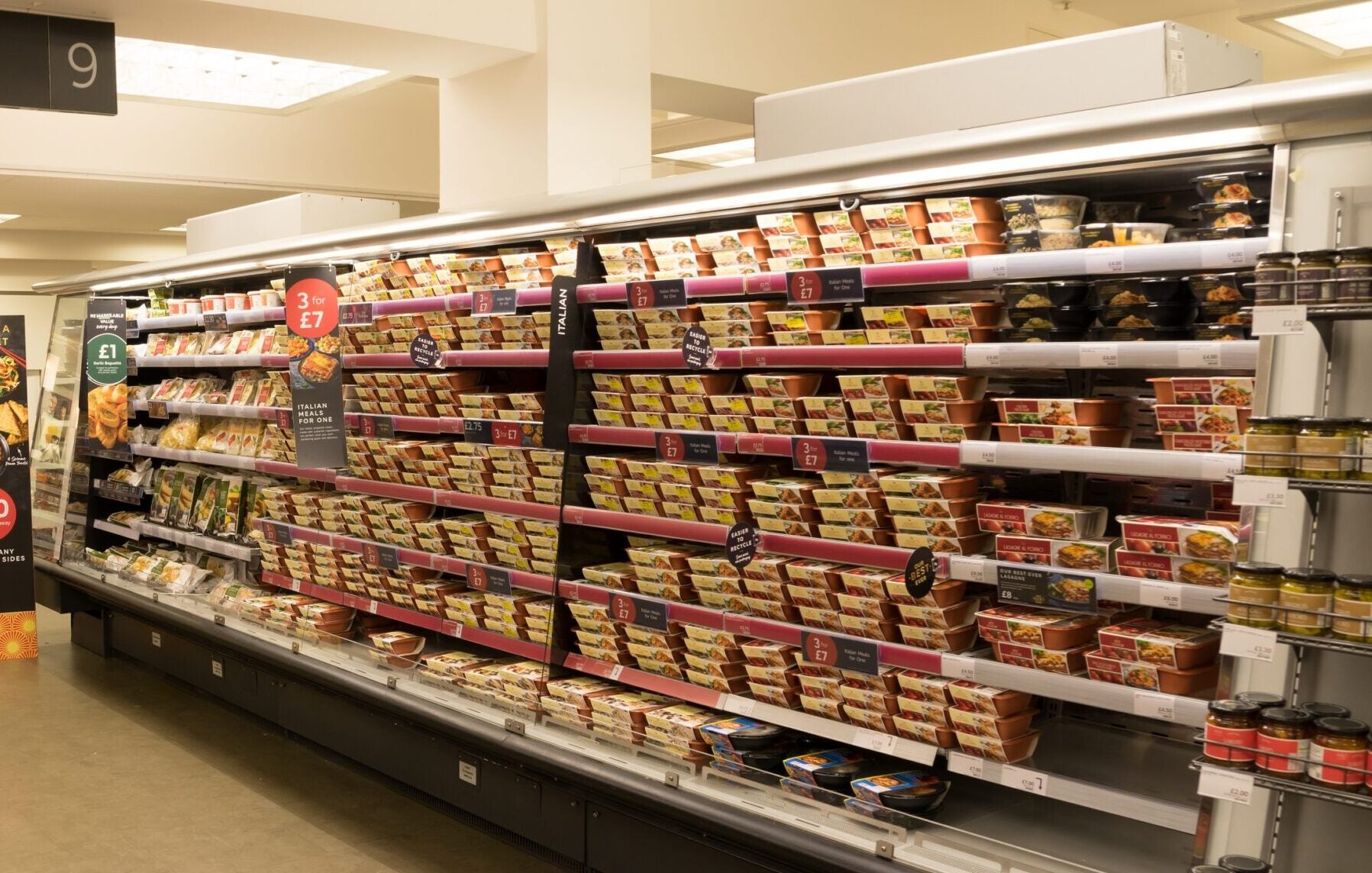
The big question for Greencore is whether the UK’s competition regulator will seek to block its takeover of Bakkavor, which would create a dominant player in the country’s private-label food-to-go and convenience categories.
Besides potential opposition to the deal by the Competition and Markets Authority (CMA), little now stands in the way of Dublin-headquartered Greencore sealing the bid for the UK-based business after the majority of Bakkavor shareholders approved the offer (after having two knocked back). The rest now vote at a meeting in July.

Discover B2B Marketing That Performs
Combine business intelligence and editorial excellence to reach engaged professionals across 36 leading media platforms.
Jobs could be a roadblock to Greencore finalising the circa £1.2-1.5bn ($1.6-2bn) transaction as the listed company has estimated up to 5% of the combined workforce could go under an offices and factory consolidation process. That would amount to as many as 1,525 staff given the employee numbers provided (Greencore 13,300 and Bakkavor 17,200).
Nevertheless, the CMA’s key consideration in such large-scale corporate combinations is primarily focused on whether the bringing together of companies would cause a “substantial lessening of competition”, followed by any positive or negative implications for consumers. Job losses could be considered if there’s a potential competition-linked component.
Such lessening seems unlikely as analysts point out a limited crossover between the two businesses in terms of portfolio duplication. However, ready meals could prove contentious given both Greencore and Bakkavor play in that area in competition with branded manufacturers.
Sandwiches and prepared salads are other crossover segments that could sway the CMA’s hand, supplied to supermarkets under their own-label food-to-go offerings. Bakkavor also produces bagged salads for the major chains.

US Tariffs are shifting - will you react or anticipate?
Don’t let policy changes catch you off guard. Stay proactive with real-time data and expert analysis.
By GlobalDataWhat Bakkavor would mainly bring to Greencore’s portfolio is pizza, breads, desserts and chilled dips. Those products would complement Greencore’s own portfolio, which ranges from sushi to chilled snacks such as quiche, soups, sauces and pickles, and Yorkshire puddings.
Consumers could also benefit – another overarching factor the CMA assesses – given the increased firepower the combined entity would have over setting prices to the retailer. While that could potentially lead to lower on-shelf prices, it does on the other hand give the seller more leverage to increase prices to preserve or boost profit margins – perhaps the more likely scenario.
“The combined group’s portfolio is a key part of the strategic, commercial and financial rationale for the transaction,” Greencore noted last week as it confirmed the company had “received irrevocable undertakings” from Bakkavor shareholders holding 69.4% of the shares to accept the offer, which has now been in the pipeline since March.
Takeover rule risks
However, Greencore suggested in last week’s filing it might walk away from the Bakkavor deal should the CMA prove to be heavy handed, citing rule 13.5 of the UK Panel on Takeovers and Mergers codes.
“While Greencore and Bakkavor are confident in the approach to secure approval of the transaction by the CMA in a Phase 1 investigation without undertaking any remedies that are material to the combined group, Bakkavor shareholders and Greencore shareholders should note that, if the CMA condition is not satisfied, including if Greencore and Bakkavor do not both agree to undergo a CMA Phase 2 reference and/or the CMA requires remedies that are material to the combined group, Greencore intends to seek the panel’s consent to invoke the CMA condition in accordance with Rule 13.5(a) of the Takeover Code to lapse the transaction.”
Rule 13.5 is detailed as follows by the takeover panel on its website.
“An offeror may only invoke a condition or pre-condition so as to cause the offer not to proceed, to lapse or to be withdrawn with the consent of the Panel. The firm offer announcement and the offer document must each incorporate language which appropriately reflects this requirement.
“The Panel will normally only give its consent if the circumstances which give rise to the right to invoke the condition or pre-condition are of material significance to the offeror in the context of the offer.”
From the CMA’s perspective, a Phase 1 investigation is typically launched to determine if a merger would result in a significant lessening of competition. Phase 2 follows should the regulator decide there is a fair risk of that prospect and involves an in-depth probe to ascertain and verify the facts.
Speaking to Just Food, an industry source gave some insight, suggesting the CMA might just lean toward approving the Greencore-Bakkavor deal but conditions could still be imposed.
“The CMA is a body that’s a law unto itself, albeit it has been encouraged by government to be more pro-growth and we may be seeing a slight or evolving position from the CMA in terms of how it looks at deals. Whether that means the likelihood of more deals coming through remains to be seen,” the source says.
“There’s a remarkably limited overlap between Bakkavor and Greencore in terms of what they actually produce.”
Deal rationale
A business combination would provide more scale around the purchasing of goods and ingredients, a reduction in overhead costs and perhaps potentially lead to production and logistics efficiencies, the source adds.
Dalton Philips, who joined Greencore as CEO in September 2022 with a pledge to return the business to pre-Covid levels of profitability – a goal now expected to come to fruition this year based on updated guidance last week – will head up the combined group post transaction.
Seemingly appearing to appease any CMA opposition, the former Morrisons’ chief said: “The combination of Greencore and Bakkavor is an unrivalled opportunity to create a true UK national food champion with an even greater breadth of category range and deeper customer relationships.
“We are bringing together two experienced teams and our complementary portfolios will drive benefits for customers and consumers across the UK. The combined group will be able to invest more in innovation and product development ensuring we can provide the consumer with greater food choices at more points in the day, bringing together Greencore’s ‘food for now’ expertise with Bakkavor’s ‘food for later’ portfolio.”
Analysts at RBC Capital Markets, including Tania Maciver, say they “don’t anticipate any material competition concerns arising from the combination”, echoing the expanded meal occasion comments from Greencore in supplying options throughout the day.
“While there is some overlap in certain UK convenience food categories, such as chilled ready meals, salads, and soups, both companies operate in what remains a highly fragmented market,” they say.
RBC estimates Greencore and Bakkavor combined would still represent a relatively small part of the UK convenience food market, which they put at around £54bn, with the two companies individually accounting for less than 4% of the total.
The deal, which will lead to a business merger with around £4bn in revenue, is expected to be completed “early” in 2026 subject to the competition authority’s approval. It would seek to achieve annual run-rate pre-tax cost synergies of at least £80m by the end of the third year.
Greencore said in last week’s filing that both companies are “confident in their approach to securing approval of the transaction by the CMA in a Phase 1 investigation without undertaking any remedies that are material to the combined group”.

Manufacturing heft
Karel Zoete, a food analyst at Kepler Cheuvreux, suggests the CMA is likely to see the deal through even if it means the sale of say a ready meals factory each for both parties.
However, between them, Greencore and Bakkavor have an extensive manufacturing network.
Greencore operates 16 sites, along with 17 distribution centres and transport hubs in the UK, it said in the filing, which added Bakkavor has 40 plants spread across three markets – the UK, the US and China.
Nevertheless, Bakkavor announced in April it was selling the China business, including its factories, while Greencore has set a condition in the takeover document that the company will also exit the US to create a purely UK-centric business post the transaction.
Greencore itself left the US in 2018 under the guidance of Philips’ predecessor Patrick Coveney after failing to make a mark.
The combined company would have much more power to invest in innovation and to invest in automation, traceability, quality and sustainability
Karel Zoete, Kepler Cheuvreux
“Based on preliminary analysis completed to date, this [the merger] is expected to lead to rationalisation in manufacturing sites currently operated by Greencore and/or Bakkavor,” the filing document read.
Zoete says any factory consolidation is unlikely to be “massive” given Greencore has outlined recently it is operating at a capacity utilisation rate of 85%, and he suggests it’s a similar position for Bakkavor.
“There’s a very clear cost synergy story on the central overhead commercial organisation. The second source of synergies is very much on the supply chain, distribution and procurement,” he adds.
“The combined company would have much more power to invest in innovation and to invest in automation, traceability, quality and sustainability.”
RBC puts forward its view: “The combined scale should provide significant supply side synergies, manufacturing consolidation is also likely as both groups have excess capacity of around 15%, and optimisation of distribution to customers should also bring benefits,” the UK analysts suggest.
Investment, automation benefits
Greencore supplies all the major supermarkets in the UK, along with the discounters, food-to-go convenience and coffee shops, travel retail outlets, and the foodservice channel.
Zoete sets out his thinking: “Where there’s an overlap, like salads and meals, supermarkets can choose alternative suppliers but there’s not an alternative sandwich supply if you’re a Marks and Spencer, for instance.
“For consumers, you have the benefit of a much more competitive and financially strong group through a leader [in the field] that can invest in automation and robotisation, which will be important for affordability and quality because of the surging labour costs.”
Greencore said in the filing it has recently invested £15m in automation, adding that while investments are “expected to increase over time, the combined group would have the resources and capability to accelerate the focus and investment to drive value for shareholders, customers and consumers”.
The RBC analysts add: “The benefits of scale, improved quality and innovation/product development are strong positives for the industry, and there are likely to be some competitive pricing improvements from the synergies over time.
“Customers in the UK grocery segment and other convenience food retailers will still have the bench strength to maintain competitive pricing in the market.”
Following the completion of the takeover, on the condition it is approved by the CMA, Greencore shareholders would own around 56% and those of Bakkavor about 44%.
However, while current Greencore CEO Philips would head up the combined business, along with his finance chief Catherine Gubbins, the top executives at Bakkavor are expected to exit.
Bakkavor CEO Mike Edwards and CFO Lee Miley would remain with the combined group for a yet-to-be set “period” to help oversee the integration.
The board would be overseen by Greencore’s current director team, with the Bakkavor founders Agust and Lydur Gudmundsson becoming non-executive directors. All other Bakkavor directors “will resign”, according to the filing.
Eyes are now focused on the CMA with Greencore’s bid already accepted by the majority of Bakkavor shareholders, and, whether the competition authority will bow to government pressure for more flexibility in deal-making decisions.
RBC concludes: “Overall, we think there are significant benefits for stakeholders in support of the combination, particularly as the convenience food sector continues to grow with increased demand for product innovation and improved quality, balanced by its value proposition.”




